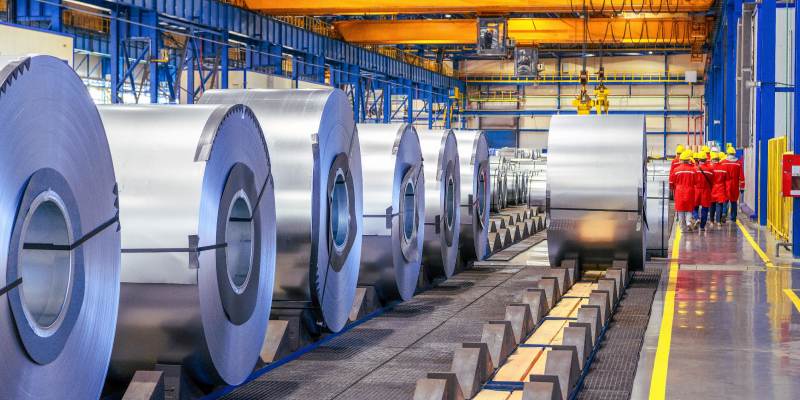In the complex world of manufacturing, the role of metal tests goes beyond mere compliance. It serves as a cornerstone for protecting product quality, enhancing production processes, and ensuring user safety. Beyond satisfying regulations, metal tests open doors to innovation, streamline processes and ensure consistent quality.
As we delve deeper into these advantages, you will uncover the diverse benefits metal tests offer, from preventing failures to instilling confidence in every product that exits the manufacturing line. For steel pipe manufacturers in Chennai, these tests are essential in maintaining their reputation for quality and reliability in a competitive market.
Benefits of Conducting Metal Tests
Those who are deeply involved in production, engineering, and material sciences must grasp the essential role of metal testing in manufacturing. The importance of these tests in assuring product quality, safety, and adherence to industry standards cannot be overstated.
With this foundational role of compliance and flaw detection established, the importance of meeting stringent safety and quality standards becomes increasingly clear.
Ensuring Compliance with Standards through Metal Tests
Compliance with standards through the metal tests is more than a routine task. It stands as a vital aspect of the manufacturing process that ensures the integrity of products and user safety. Regulatory benchmarks serve as guidelines for quality and safety within the manufacturing sector.
Metal testing plays a critical role in this process, acting as a gatekeeper to ensure only materials meeting these stringent standards advance to production. For example, standards such as ASTM International and ISO offer frameworks for testing metals on properties like tensile strength, corrosion resistance, and ductility.
Early Identification of Material Flaws via Metal Testing
The early detection of material flaws through metal testing is essential for assuring the quality and reliability of metal components. These assessments aim to uncover various flaws, such as cracks, deformations, and inclusions, which could undermine the integrity and performance of metal products. For instance, ductility tests are crucial for revealing how a metal reacts under stress, potentially indicating a tendency towards cracking or breaking.
The effect of early flaw detection on the manufacturing process and the quality of the final product cannot be overstated. By identifying issues promptly, manufacturers can correct them before they escalate, conserving time and resources. This proactive approach prevents the inclusion of defective materials in final products, enhancing their durability and reliability, thereby increasing customer satisfaction and trust.
Maximize the Full Potential of a Material
Grasping the composition and potential of the materials you work with is crucial in manufacturing. This understanding optimises material usage. Metals, with their diverse properties, form the backbone of numerous manufacturing processes. Conducting thorough metal tests allows you to determine the most effective use of a metal, ensuring it meets the specific requirements of your project.
Understanding a metal's properties through testing can significantly boost production efficiency. It guarantees that the materials integrated into manufacturing processes are well suited to their intended tasks, minimising the risk of machinery damage and reducing manufacturing time. This efficiency leads to better quality, durability, and performance of the final products.
Increases Production Efficiency

Executing through metal tests before materials enter the production cycle can greatly optimise the efficiency of your manufacturing processes. Substandard or flawed metals can damage machinery or slow operations by causing stress on equipment. By evaluating the suitability of every material entering the production cycle, you are not merely ensuring the smooth operation of your machinery but also enhancing overall production efficiency, reducing downtime, and preventing costly equipment failures.
One effective tactic to achieve this is through rigorous metal testing. This guarantees that only materials that fulfil your stringent requirements make it to the production floor, significantly reducing the likelihood of stoppages and errors. In striving to improve production efficiency, incorporating comprehensive metal testing is crucial. It reinforces your commitment to delivering high-quality products to your clients promptly.
Identify Health Risks
Recognising health risks associated with metals in manufacturing is critical. Metals, essential in production, may contain toxic elements like lead, arsenic, mercury, chromium, and cadmium. These substances pose severe threats to human health and the environment, potentially resulting in organ failure and other serious conditions with prolonged exposure. Hence, metal testing is vital for the early identification of these toxic risks.
By analysing metal compositions, manufacturers detect harmful substances, ensuring safety for consumers and the environment. This knowledge allows for the avoidance of materials that could present health risks, protecting both consumers and workers. It highlights the commitment to safety and quality, emphasising the essential role of metal testing in the manufacturing sector.
Protect Your Investment
By engaging in comprehensive metal testing, you are taking a proactive stance towards minimising the risk of using materials that could lead to product defects, production delays, or, in the worst-case scenario, catastrophic failures. These assessments help identify any intrinsic flaws in the metal, such as cracks, impurities, or inconsistencies in composition, which could undermine the integrity of the final product. Addressing these concerns early in the manufacturing process can save substantial costs and time, preventing the need for expensive recalls or redesigns.
Moreover, metal testing plays a crucial role in ensuring compliance with industry standards and regulations. By demonstrating a commitment to quality and safety through rigorous testing, you can cultivate a robust brand reputation that distinguishes you from competitors. Protecting your investment through metal testing is a strategic approach for any business involved in manufacturing or engineering.
Safeguarding Success: The Critical Role of Metal Testing
In your journey through the manufacturing landscape, metal testing emerges not only as a procedure but as the foundation of quality assurance and product reliability. This focus on stringent testing and compliance reflects a commitment to excellence that resonates deeply with today's industry standards. It is more than preserving the structural and functional integrity of materials.
It is about solidifying the trust between you and your clientele, ensuring that every project meets and exceeds expectations. Remember, the pursuit of excellence is continuous, urging you to embrace advanced testing methodologies and equipment adaptations, thus maintaining your competitive edge in a rapidly evolving industry.
At MKK Metals, we exemplify this commitment to quality through metal testing protocols, ensuring that every product we deliver meets the highest standards of reliability and performance.

